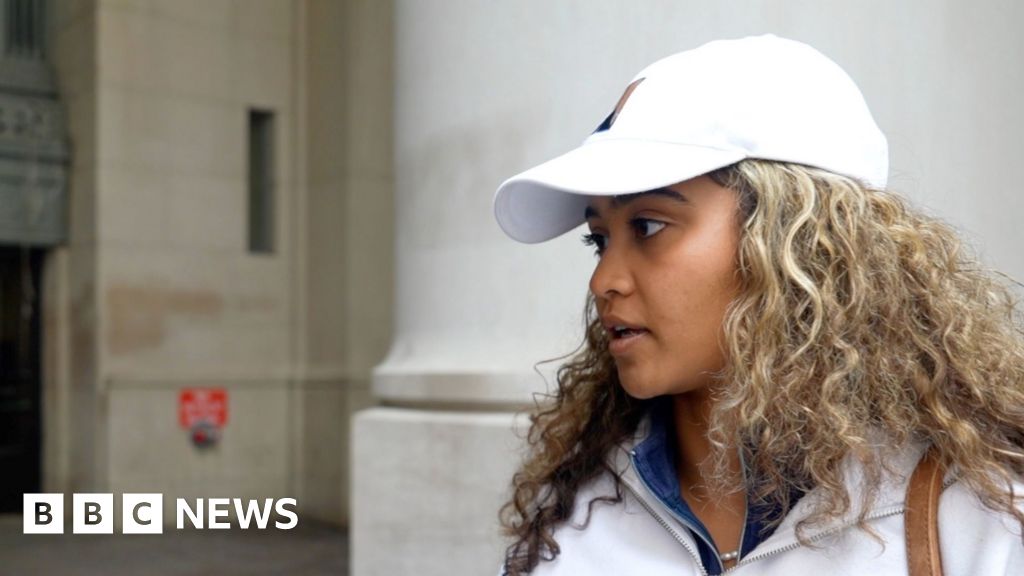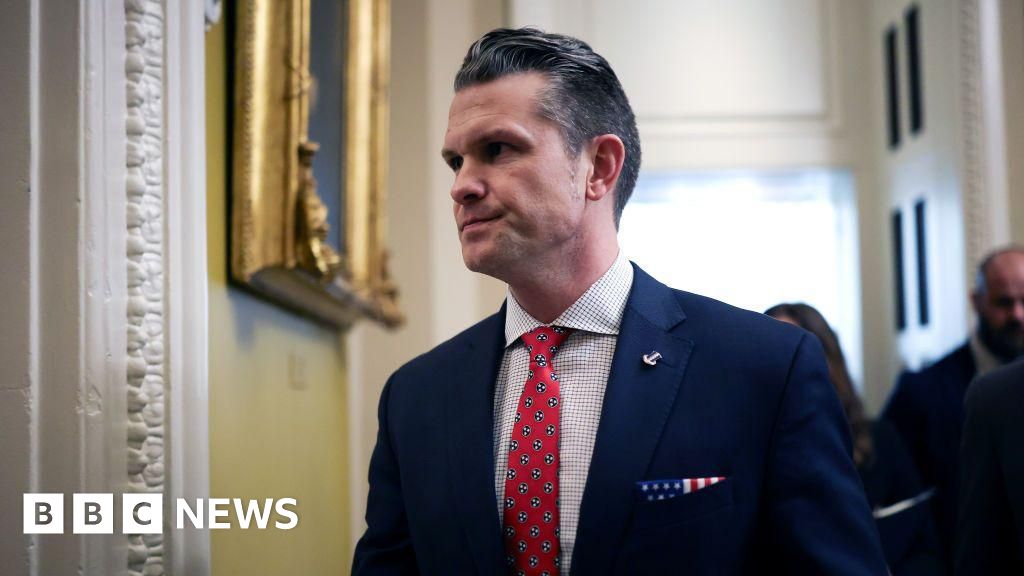ARTICLE AD BOX
By Ritu Prasad & Holly Honderich
BBC News
image sourceGetty Images
image captionThousands of cases have been brought against Catholic clergymenA change in law in New York has allowed for the filing of more than 9,000 child abuse claims - including cases against Prince Andrew, Bob Dylan and high-profile Catholic priests - previously blocked by the state's statute of limitations.
Warning: The following content may be upsetting to some readers.
Tom Andriola was 25, standing on the edge of Bryce Canyon in Utah, and an impulse to jump kept flashing through his mind.
It had been 14 years since Mr Andriola's adopted older brother sexually abused him, but the memory was still raw. There, on the edge of the canyon, in the seclusion of the park, his wife became the first person he told.
"I truly thought if I spoke anything about this, that he was going to come and kill me," Mr Andriola recalled.
A few weeks earlier, that same brother had paid them a visit and stayed an extra day. Something during that trip triggered memories of the abuse, making Mr Andriola anxious and impatient for his brother to leave.
After Utah, he bottled the memories up again for several years.
But because the abuse happened so long ago, the brother was never held to account. By the time Mr Andriola was ready to publicly disclose his story, the statute of limitations to bring suit in New York state, where the abuse took place, had expired. Though his brother was eventually convicted for molesting another boy, Mr Andriola was not allowed to testify at his trial.
"I never got an acknowledgement and apology. The only accountability I got was that he got caught with someone else," he said.
image sourceGetty Images
image captionMr Andriola, an abuse victim, contemplated suicide at Bryce Canyon National ParkNow, thanks to a change in state law, people like Mr Andriola might stand a better chance at justice. New York's Child Victims Act (CVA) suspended the statute of limitations on child abuse cases for two years - allowing potential victims to bring civil suits they couldn't previously have pursued.
The law, passed in 2019, gave victims until 14 August 2021 to bring forth claims. By that deadline, more than 9,200 were filed. Among the defendants are senior British royal Prince Andrew and singer Bob Dylan - both of whom deny the allegations.
Marci Hamilton, the chief executive of Child USA, a non-profit working to end child abuse, said the nearly 10,000 claims still represented only "a very small" portion of what is thought to be the true scale of abuse in the state.
Data suggest that about one in five girls and one in 13 boys will be sexually abused in the US - "that's 15-20% of the population," Ms Hamilton said.
Studies have found that about one-third of child sex abuse victims will speak out about what they experienced before adulthood. But another third do so far later in life - the average age across the US is 52. The rest do not disclose at all.
Fear - of retaliation, of not being believed - is central, as is shame, with some victims worried they brought the abuse upon themselves.
Children may not immediately recognise what happened to them, often at the hands of a trusted adult, as abuse or rape.
image sourceGetty Images
image captionPrince Andrew and Bob Dylan are among those against whom lawsuits have been brought under the new law. Both deny the abuse allegationsThe rectory at St Cecilia's Catholic Church in New York City was bigger than David Ferrick, then 10, thought it would be.
A father at his Catholic school was giving him the grand tour. Mr Ferrick, now 52, had asked to speak to the priest one-on-one at the urging of his mother, who thought he was in need of some fatherly guidance.
This man was the obvious choice: he was "everybody's friend", Mr Ferrick said, the cool priest who played The Beatles and took the boys to school basketball games.
Mr Ferrick recalled their meeting. He was asked by the priest to go to the man's bedroom - for privacy, the father said. The muggy air of the summer afternoon had left the room stifling.
"Let's take off our shirts," Mr Ferrick remembered the priest saying, before suggesting they should "rest a bit."
"I'm going to take my pants off too, it's really hot," he had allegedly said. "You should do the same."
The 10-year-old felt it was a strange request. But he trusted his priest.
According to Mr Ferrick, the priest then had him lay down next to him on the bed - for an afternoon nap before they spoke, he explained.
"He was behind me, spooning me," Mr Ferrick said. "I thought that was weird - but that he really loves me because he's a priest."
"I started noticing him fingering around the waistline of my underwear, snapping it, and then rolling it down. I was doing everything I could to pretend I was asleep. At 10-years-old, I couldn't process what was going on."
Mr Ferrick's former priest is now one of 24 clergymen named by 27 plaintiffs in a New York civil suit, filed under the CVA.
The man, who has been accused of abuse by several former altar boys, has denied the charges and could not be reached for comment. He was removed from the ministry in 2004 and defrocked in 2006. The Brooklyn Diocese now lists him among former clergy members about whom the diocese received allegations of sexual abuse with a minor.
Mr Ferrick told no one about what had happened for 20 years. By that point, the legal window to take his case to court had closed.
Before the CVA, victims of child sex abuse in New York had until their 21st birthday - three years after becoming an adult in the eyes of the state - to file civil claims. The statute of limitations to file criminal suits is even shorter.
Now, because of the new law, Mr Ferrick has a chance to tell a court what happened.
"When I heard that the statute of limitations were extended out, I was pretty excited," he said. He is now serving as a witness in the case against the former priest - one of thousands of those filed under the CVA involving allegations against Catholic clergy.
Among the most high profile of these cases is a suit against the Archdiocese of New York for alleged sex abuse by Theodore McCarrick, the former Catholic Cardinal who was defrocked in 2019. He is now the highest-ranking Catholic official to face charges of sex abuse in the US.
The former clergyman, 91, was found by the Vatican to have sexually abused a boy in the 1970s, but has so far avoided prosecution in the US, largely because statutes of limitations have tied up decades-old cases.
He now faces civil charges in New York and New Jersey, as well as criminal charges in Massachusetts for sexually abusing a teenager in the 1970s.
His lawyer, Barry Coburn, declined the BBC's request for comment.
The mounting suits against clergy have driven parishes to financial ruin. In the past two years, four of New York's eight dioceses have filed for bankruptcy.
This gaping legal and financial exposure for the Church has driven much of the opposition to the CVA.
New York Assemblyman Michael Fitzpatrick, one of three state lawmakers to oppose the CVA, described the legislation as a money-grab by trial lawyers and a gratuitous alteration of American legal principles.
Mr Fitzpatrick, a practicing Catholic whose own diocese declared bankruptcy in 2020 amid hundreds of abuse allegations, told the BBC the cost was "unfair" to parishioners whose church contributions may be used for legal battles.
The CVA "created an opportunity for those forces who don't like the Catholic Church to do it harm", he said.
"Was there a problem? Yes there, was," Mr Fitzpatrick said, when asked about sex abuse by clergy members. "But the church had gone ahead and moved forward to address the issue."
"The legal system should not be tinkered with to satisfy the whims of the day," he said. "How do we know all these claims are sincere, or accurate? Do you think they're all sincere? I don't."
Statutes of limitations for sex abuse vary widely across the US. Though New York has made headlines because of the sheer volume of cases in the state, advocates for victims say it is in the middle of the pack when it comes to abuse laws.
Under the CVA, the criminal statute of limitations for felony sexual abuse of a minor has been extended to age 28. For civil cases, the limit now extends to age 55.
But in Maine and Vermont, for example, there is no time limit for sex assault victims to file civil suits.
In North Dakota and Oregon, the deadline for criminal suits is before the victim turns 40. In Massachusetts, where former-cardinal Mr McCarrick faces criminal charges, the typical limitation for sex crimes is suspended when the alleged abuser, if not a Massachusetts resident, leaves the state after the alleged abuse.
Mr Andriola sees the CVA as a modest first step.
"It's not nearly enough," he said. "There just shouldn't be a statute of limitations for these cases."
And while the CVA became law in the wake of the #MeToo movement, its passage was a long time coming. The bill was first introduced in the New York legislature in 2006 by Assemblywoman Margaret Markey.
"It is the victims who suffer the most as a result of our state's archaic statute of limitations for these offenses," Ms Markey said in 2015 when she again pushed for the bill.
The cause was personal for Ms Markey. Though she did not speak of it on the assembly floor, one of her sons told her later in life that he had been sexually abused as a child by a priest at her family's Catholic church.
Civil payouts can be essential to supporting services to help survivors.
Victims of child abuse are more likely to suffer from conditions like depression, PTSD, substance or alcohol abuse, experts say, and treatment in the US can be prohibitively expensive.
Ms Hamilton of Child USA puts the average cost at around $830,000 (£604,000) over a lifetime.
Mr Ferrick's abuse made him angry. "It's something I'm still working on," he said. And he worries intensely about his children - three daughters and two sons. He would "never, ever, ever" let his own children have the freedom he did, he said, recalling his independent childhood in New York.
"Every time I think of my kids going somewhere, the first thought that comes to my mind is how they're going to get hurt," he said.
Following the success of the CVA, advocates like Mr Andriola are now turning their gaze to the Adult Survivors Act.
That act would create a one-year window for adult victims of sex abuse to file claims. The legislation, which passed unanimously in the New York Senate in June, has been stalled in the Assembly since January.
And he hopes others will follow.
"When somebody has enough and is ready to come forward about a certain offender, the floodgates start to open because finally the other survivors feel like it's safe," he said.
If you have been affected by sexual abuse or violence, help and support is available at BBC Action Line. In the US, you can call the Childhelp National Child Abuse Hotline at 1-800-422-4453.
Graphics by Angélica Casas

 3 years ago
105
3 years ago
105








 English (US) ·
English (US) ·